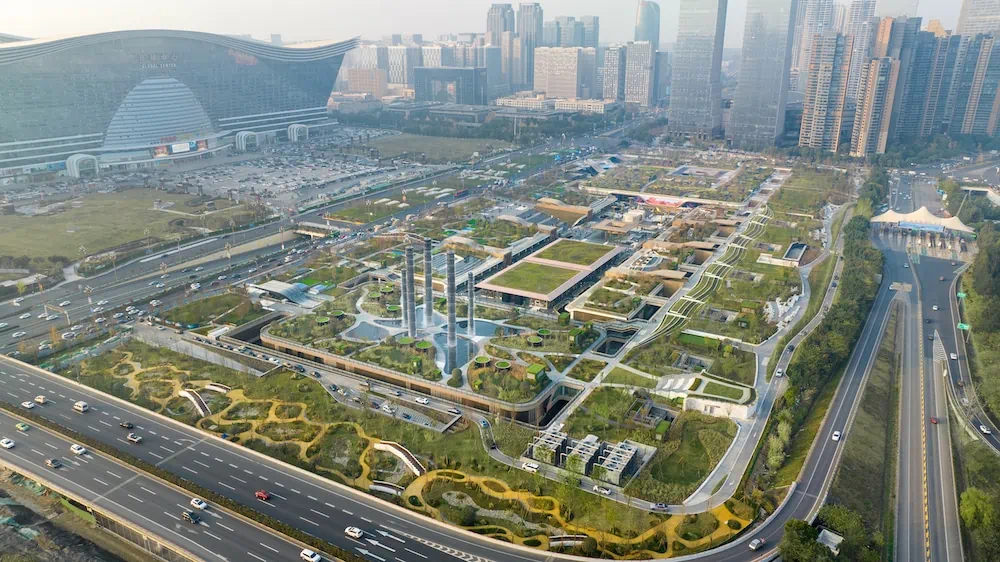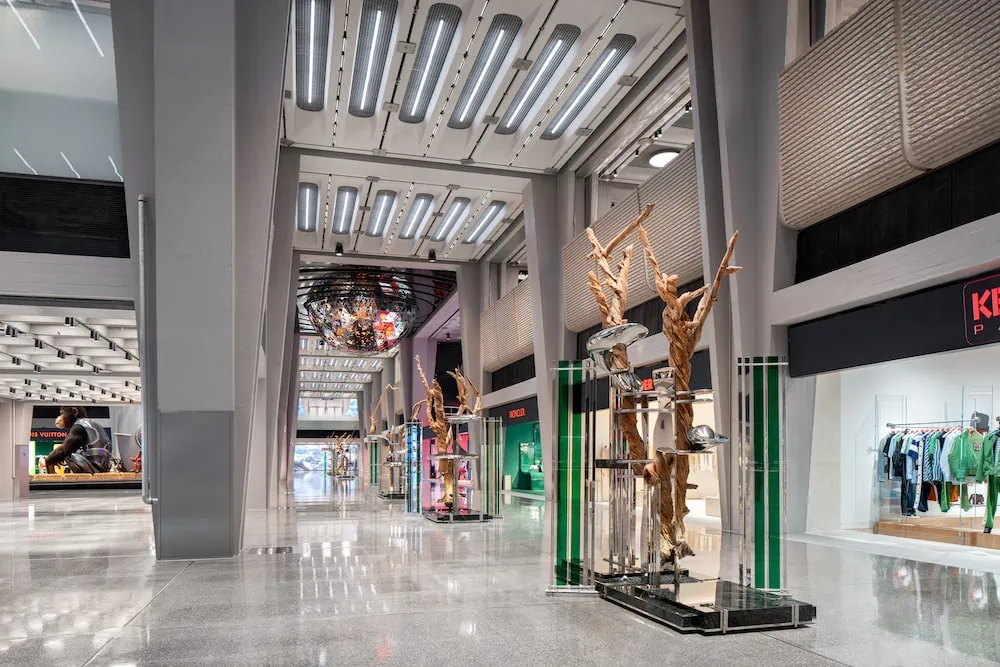Ahead of China Consumer 2023, Focus speaks to Simon Mitchell, co-founder of global design studio Sybarite, about the future of retail in China
Simon co-founded Sybarite with Torquil McIntosh in 2002, since which time they have delivered nearly 3,000 projects, including retail and experiential concepts, and designs for notable brands and retail operators of varying scales, from monobrands through to master planning. Their successful repositioning of the Shin Kong Place mall to ‘SKP’ in China has given them a unique insight into the Chinese consumer and the Chinese retail landscape. Project locations include Beijing, Xi’an, and Chengdu, with Wuhan and Hangzhou soon to launch. In addition to SKP, Sybarite creatively directed and conceived SKP-S, an ongoing next-generation retail concept.
Simon Mitchell will be speaking at China Chat | The Future of Experiential Retail in China and how UK Brands can benefit from its Innovation in London on Wednesday, 25 October. Click here to register
Tell us more about how Sybarite entered the China market
Entering the China market was a purposeful new business decision around 2012/13. We were selected to be part of a private competition and were awarded the Shin Kong Place project in Beijing, working on the repositioning and rebranding of the mall to a department store. The Department of Trade and Industry also provided us with an opportunity to travel to China with the then government under David Cameron.
What major successes and growth has Sybarite experienced in that time?
We have scaled the SKP concept exponentially since 2013 and created three very important brands: SKP, SKP-S & DT51. We have created a house style and architectural language that can support growth, brand diversification and brand extensions. We have worked and continue to work with notable developers such as CR Land, Swire, and Hongkong Land, for example. We also won the Queen’s Award for Enterprise for our work in China in 2016 and 2022.
“China presents a unique opportunity for Sybarite to embrace the strength of the luxury retail market in architectural, design and foresight terms and to capture the bravery and strategic future facing vision of our clients coupled with the aspirations of the end users”. Simon Mitchell, Co-Founder, Sybarite
How critical is the China market to Sybarite’s global strategy?
China is integral to our strategy as we are the architectural partners for SKP, planning current and future design, architecture and retail strategy. However, we do purposefully look at and take on projects of all scales. Most of our business and expansion is in Asia and the Kingdom of Saudi Arabia, although we also do work in Europe and the UK at the moment.
Tell us a little bit about how Sybarite connects with consumers in China. How do Chinese consumers differ from consumers in other markets?
The Chinese market facilitates a brave approach to retail, which we embrace. Exclusivity and experimentation are key, yet at the same time, longevity is playing a part in the design process so we are mindful of what we propose, which needs to be agile and transformable and present a return on investment for many years to come.
Traditionally, elsewhere in the world, there has been a more conservative approach to retail in all senses. I would speculate that this is because of the constraints of operating within the heritage/legacy department store sphere and the connotations and the parameters that automatically assumes and enforces. In China, on the other hand, the consumers themselves have more of an appetite for risk and experimentation and welcome riding the high and fluctuating waves of new fashion trends, which require the retail formats to follow suit.
The sentiments of the retail operator and the associated brands (the store brand mix) matter enormously to the end consumer, as well as traction and place-making opportunities. Location is also key, and Sybarite’s design ethos is about synchronising with the existing and future cultural aspirations of a location.
We are also working within the Chinese government parameters around carbon reduction goals (i.e., to reach carbon neutrality by 2060) and creating structures that incorporate sustainable mindsets and taking building below ground level.
What are your thoughts and reflections on today’s Chinese consumer landscape, and how has this changed over the pandemic?
The pandemic influenced a rethinking of consumerism. Consumers are now gravitating to less but better and more unique consumption experiences (connected to brands and brand values). For example, the Chinese customer is consuming luxury brands as a way of life and improvement of their quality of life rather than simply as labels and price points.
We have also seen the rapid economic rise of China linked to increased urbanisation and the digitalisation of society, including digital marketing and the impact of KOLs and the blurring between digital and physical experiences and environments. This has affected Chinese shopping behaviours and continues to do so. Social media has a huge impact in decision making and product acquisition, and building trust with Chinese clients through authenticity and integrity is integral.
As the success of projects such as SKP has shown, there is a need for experiential retail – for escape, for discovery, for otherworldliness. Exclusive and empathetic luxury experiences are important. Both brands and retail operators are investing in innovation and sustainability to remain relevant and on point, and it is also necessary to create a sense of belonging within the community (i.e., in line with attitudes, beliefs, allegiances and values).

Aerial view of SKP Chengdu, photo by Nick Kuratnik, courtesy of Sybarite
What do you think will be the hottest consumer trends in China over the next five years?
For Sybarite, we are mainly looking at experiential retail and enhancement of the customer journey, as well as brands extending their reach beyond Tier 1 cities.
We will see the blurring of the boundaries between brand and customer and the extension of the consumer life cycle through digital tools such as virtual shopping environments which serve to engage the customer on a deeper level. Data gathering through these digital tools will be used to further hone and enhance customer experience, for example, by offering personalised services to build loyalty.
Finally, it will be important to focus on localisation which goes beyond literal brand translation and is more about a deep understanding of local culture, values and establishing long-term relationships and customer loyalty.
“SKP Chengdu crystalises the evolution of both consumers and retailers over the last three years of Covid-imposed travel restrictions in China. Consumers have sought and demanded the fusion of travel, experience and shopping, blended harmoniously in one journey in perfect sync with the city’s pioneering approach to placing nature at the heart of development.” Antoaneta Becker, CBBC Director of Consumer Economy
What are Sybarite’s future ambitions and plans in China?
We are evolving ourselves as a studio with larger and more complex master plans. This is already evident with SKP Chengdu and there are further plans in place that will be revealed in the next five years, including work in multiple cities in China.
We will focus on shopping malls and department stores, brand extensions, hospitality and lifestyle and have a hand in the art curation, digital content, and retail strategies within those projects.
If you could give advice to UK consumer brands entering China, what would it be?
China is a long-term commitment, and it goes without saying that you need to research the landscape fully. Make sure that you differentiate your service and vision, as there is a lot of competition in the market.
Consider and respect the nuances of Chinese culture. Take time to understand the different demographics and the end consumers very well. This will require an agile approach.
Build strong and trusted relationships on the ground in China to facilitate your projects and find someone who can advise you on legal and local regulations.
China Chat | The Future of Experiential Retail in China and how UK Brands can benefit from its Innovation
CBBC’s popular China Chat series for consumer brands returns on 25 October in London.
The session will look at China’s evolving retail landscape and what it means for UK consumer brands seeking to engage with Chinese consumers in the post-pandemic era — both in China and in the UK.
Event speakers include Simon Mitchell, Co-Founder of Sybarite; Champa Selim, Deputy Director of Greater China and Southeast Asia at Bicester Village; Antoaneta Becker, Director, Consumer Economy at the China-Britain Business Council; and Celine Tang, Retail & E-commerce Sector Lead at the China-Britain Business Council.
Click here to register
Photos by Nick Kuratnik and Shihao Xiao, courtesy of Sybarite




